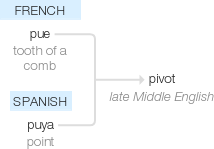Pivot
late Middle English: from French, probably from the root of dialect pue ‘tooth of a comb’ and Spanish pu(y)a ‘point’. The verb dates from the mid 19th century.
wiktionary
Borrowed from French pivot, from Old French pivot(“hinge pin, pivot, penis”) (12 c.), of unknown origin.
etymonline
pivot (n.)
"pin on which a wheel or other object turns," 1610s, from French pivot, from Old French pivot "hinge pin, pivot" (12c.), also "penis," a word of uncertain origin. Pevetsheres, evidently some kind of shears, is mentioned in a will registered in York in 1398. Figurative sense of "turning point, that on which some matter hinges or depends" is recorded from 1813.
pivot (v.)
by 1841, "to turn or swing on or as on a pivot," from French pivoter and from pivot (n.). Mechanical meaning "furnish with a pivot" is by 1851. Related: Pivoted; pivoting.
